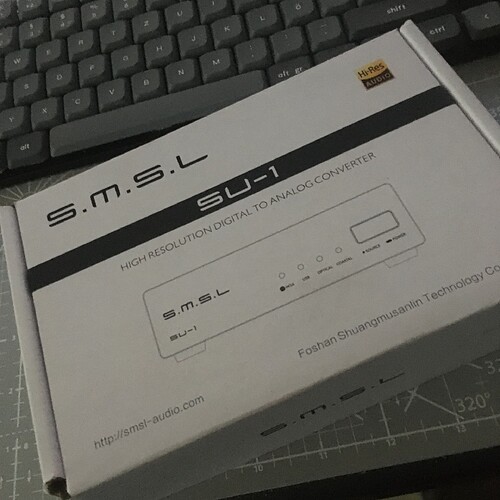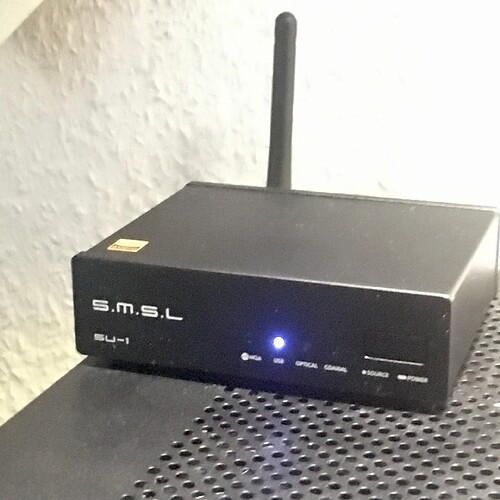What size of display is that?
Isn’t the lighting distracting during watching of movies? I imagine the backlight shifts and adapts to the current scene, correct?
It’s an Dell 34" UWQHD.
Yes, it does adapt to the displayed image based on the fisheye camera which is most likely picking only a few zones and using this color information to control the RGBIC LED strip. In short, the strip is segmented into several segments, each LED could be addressed individually.
But I didn’t bought it only for that feature, I can configure several modes. Constant backlighting to reduce eyestrain. That has been the main motivation behind that purchase. That fisheye camera is optional and it could be used without it.
At the moment, I don’t know if I will use that adaptive movie mode regularly. The shifts in color are a bit harsh in certain circumstances. It’s definitely not the polished solution which Phillips integrates into their high end TV sets as a premium feature. And what I really miss currently, or what I’ve simply not discovered yet, are precise fine controls for the color temperature.
It looks bigger than that. I was thinking it was like 49" ![]()
Next time I’ll add a banana for scale ![]()
49" … would be a pretty big transition from an 24". Couldn’t justify that kind of investment.
And my neck would have complained about it a lot. Its troubling me more than enough already.
Fun fact: Back in the day, in the times of dial-up internet. When flatrates weren’t a thing.
A friend of mine used his gamer tag Monitor32" during the LAN sessions we had every once in a while. TFTs and LCDs weren’t commercially available yet.. More or less as a joke that it is pretty dumb to carry 21" CRTs to a LAN Party each time. Nobody would have guessed that there would be LCD panels in sizes of up to 110".
Clarks are very good shoes, I had my first ones when I was 16, back then they were still made in England.
These are my second pair of clarks. I am very satisfied with them
Yes, I only wear Clarks.
In contrast to the regular folks, I guess my latest purchases are too much tech.
In short, as of today, this year of tech upgrades finally comes to an conclusion.
Only one more thing is missing and haven’t arrived yet. And I’ll have replaced or even upgraded the devices I’m using.
First of all, in addition to the Govee TV backlight which I’ve purchased recently, I also ordered a monitor light bar.
As I tinker around and do some other stuff at my desk, I wanted a more compact solution. To replace my old desklamp.
In short, I’m disappointed. It came as an already opened box. Hasn’t been used, but was definitely a customer return. Additionally, The mounting is solved with magnets. One magnet directly fell out of its recess. Not the worst thing and easily to fix. The larger issue: if i adjust the light to an angle that doesn’t illuminate the screen, but the desk space in front of me, then it’s a visible band of light, the LEDs a partially visible. It includes a remote control. which worked out of the box. 3 light modes, and a big dial knob. Which takes way too much turns for controlling the brightness. Pretty flimsy and lightweight too.
All in all, I’m not pleased. Not by the product. And also not by the seller.
In short, either I demand a partial refund. Or I’ll send it directly back.
But know for the much more pleasent purchase.
Scored an SMSL SU-1 DAC used locally, less than MSRP and no need to ship another one out of China.
This thing is tiny. Thus, a banana (lunch box) for scale.
And don’t be confused about the WLAN antenna, the SU-1 only has USB-C. S/PDIF and coaxial audio inputs.
The WLAN antenna is the one of my computer and exclusively being used for bluetooth connectivitiy.
My first: sonic impressions. In comparison to the audio chipset of my motherboard… totally different sound profile. Had to dial down my amplifiers volume at least 20% directly. Haven’t thrown serious music onto it yet. But what I can hear is much nicer up so far.
AKM chips, to my ears, are more “musical” than ESS chips. I approve ![]()
I guess I’ll have to dive into pipewire config files to get the most out of it. Currently I haven’t any serious efforts to optimize my installation of EnOS to achieve better sound. Any tips ?
You can read it here to start ![]()
Oh boy, what kind of rabit hole have I gotten into…
In short, sadly the wiki part is a bit out of date. And I’m currently struggling with the configuration of wireplumber.
As configuration files in '.lua format aren’t supported anymore and have to be specified differently in '.conf files.
In specific : cat /proc/asound/card0/stream0 returns:
SMSL SMSL USB AUDIO at usb-0000:08:00.3-3.2, high speed : USB Audio
Playback:
Status: Running
Interface = 1
Altset = 1
Packet Size = 72
Momentary freq = 44100 Hz (0x5.8330)
Feedback Format = 16.16
...
Interface 1
Altset 1
Format: S32_LE
...
Bits: 32
...
Interface 1
Altset 2
Format: S32_LE
...
Bits: 24
...
Interface 1
Altset 3
Format: SPECIAL DSD_U32_BE
...
Bits: 32
Thus, currently the DAC is using the S32_LE integer format in 32bit precision. But 24 bit should be totally sufficient. As I don’t have Tidal or AppleMusic, just a spotify subscription. I’ld like to set it 24bit instead of 32bit. But I can only find configuration examples which work with pipewire-media-session, none for wireplumber.
Additionally, I’m a bit clueless and I may want to change my current spotify client, it’s currently running
on the rodio backend and not on alsa if I’m not mistaken. Thus, when I launch
pw-top -b
R 52 1024 44100 ... S32LE 2 44100 alsa_output.usb-SMSL_SMSL_USB_AUDIO-00.analog-stereo
R 33 1102 44100 ... F32LE 2 44100 + alsa_playback.librespot
R 69 4630 44100 ... S16LE 2 44100 + spotify-player
Am I seeing this right that rhe output of spotifly-player is in 16bit integer precision,
librespot using 32 bit floating point and then the output is than finally in analog stereo 32 integer precision ?!
Note: Just for readability I’ve removed some stuff… indicated with ...
In fact, there is no great need to dive deep into it ![]()
Just as an example: I changed the pipewire settings to support all operating frequencies of my Fiio K7bt, and set it to always work in 32 bits, using the Alsa output. That’s it ![]()
There are no issues with the sound quality. When using the player with local files, the output to my DAC always matches the parameters of the file being played.
I listen to Qobuz through Firefox - everything is the same, if the file has 96 kHz, then it is output from Firefox to the DAC at the same frequency. The pw-top clearly shows everything.
That’s exactly what I did. Copied all the supported frequencies of the SMSL SU-1 to the pipewire.conf, without enabling a default value.
Seems that the librespot instance which is listed via pw_top isn’t really involved at all. As I could stop the service without an influence on the playback at all, thus it disabled it altogether.
Some of the troubleshooting within the arch wiki didn’t worked directly, Such as no sound until 30% volume. At least the lower threshold seems to be at 15% now.
I can’t say anything about the volume… On the computer, in all programs, the level is set to 100%. And I adjust the volume directly on the DAC using its volume knob.
Well, the SU-1 only has an input selector. Nothing else.
And as I’m using it in combination with an power amplifier to drive a pair of rather large vintage speakers at the moment… The amplifier is usually set to 25% volume. In the end it’s not a real problem… when I set the amps volume to 100%, there is no sound until it turn up to 3%.
Guess I wasted a lot of time today on a problem that doesn’t really exist ?
Now that’s the true definition of an audiophile, I guess ![]()
Better said, a clueless one who doesn’t even has access to any sources in excess of 44.1kHz at 320 kbps.









